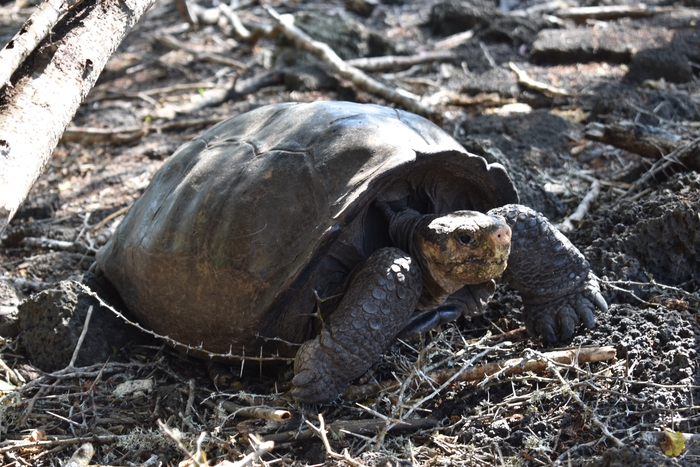New genetic research has found that the Galapagos giant tortoise Chelonoidis phantasticus is not extinct.

Credit: Lucas Bustamante © Galapagos Conservancy
New genetic research has found that the Galapagos giant tortoise Chelonoidis phantasticus is not extinct.
An international research team sequenced the genome of a the only known specimen of the Fernandina Island Galapagos giant tortoise found in 1906 and compared it with that of a female tortoise that was found living on the island in 2019. Their analysis confirmed that the tortoise found alive is from species thought to be extinct more than a century ago.
Publishing their findings in the journal Communications Biology, the scientists sequenced the genomes of both individuals and compared them to all living species of Galapagos giant tortoises, revealing that the two known Fernandina tortoises are from the same lineage and distinct from all others.
The study was led by researchers from the universities of Newcastle, UK, and Princeton and Yale, in the USA.
Study lead author, Dr Evelyn Jensen, Lecturer in Molecular Ecology at Newcastle University’s School of Natural and Environmental Sciences, said:
“Only two tortoises have even been found on Fernandina Island, and here we have shown that they are indeed members of the same species, and different from the other Galapagos tortoises. It is a truly exciting discovery that the species is not in fact extinct, but lives on.”
Whether there are any remaining tortoises living on Fernandina Island has intrigued biologists for over a century. Fernandina Island is an active volcano that stands alone on western periphery of the Galapagos Archipelago and is reputed to be the largest pristine island on Earth. The male specimen used in the study was collected by the explorer Rollo Beck during an expedition by the California Academy of Sciences in 1906.
In 2019, the female tortoise nicknamed “Fernanda” was found in an isolated patch of vegetation, cut off from the main vegetated area on the southeast of the island by several lava flows. Scientists estimate that she is likely well over 50 years old but is small with her growth stunted. Fernanda is now in captivity in the Galapagos National Park Tortoise Center.
The study results offer hope for the recovery of this species, and, encouragingly, recent signs of at least 2–3 other tortoises were found during other expeditions on the island.
Dr Jensen added: “What comes next for the species depends on whether any other living individuals can be found. If there are more Fernandina tortoises, then a breeding program could start to bolster the population. We hope that Fernanda is not the ‘endling’ of her species.”
For now, Fernanda is in a similar position to the famed Lonesome George, who captured hearts and headlines as the last surviving individual of the Pinta Island Galapagos giant tortoise. Lonesome George lived out his final decades of life in captivity but never bred, and when he died of old age in 2012, his species went extinct.
More expeditions are planned to search the inaccessible interior of Ferandina Island for tortoises. While Dr Jensen and colleagues await news of whether there are more surviving tortoises, they will continue their work to understand how the Fernandina species fits into the evolutionary history of the Galapagos giant tortoises.
Reference:
Evelyn L. Jensen, Stephen J. Gaughran, Nicole A. Fusco, Nikos Poulakakis, Washington Tapia, Christian Sevilla, Jeffreys Málaga, Carol Mariani, James P. Gibbs & Adalgisa Caccone (2022). The Galapagos giant tortoise Chelonoidis phantasticus is not extinct. Communications Biology. https://doi.org/10.1038/s42003-022-03483-w
Journal
Communications Biology
DOI
10.1038/s42003-022-03483-w
Method of Research
Computational simulation/modeling
Subject of Research
Animals
Article Title
The Galapagos giant tortoise Chelonoidis phantasticus is not extinct.
Article Publication Date
9-Jun-2022




